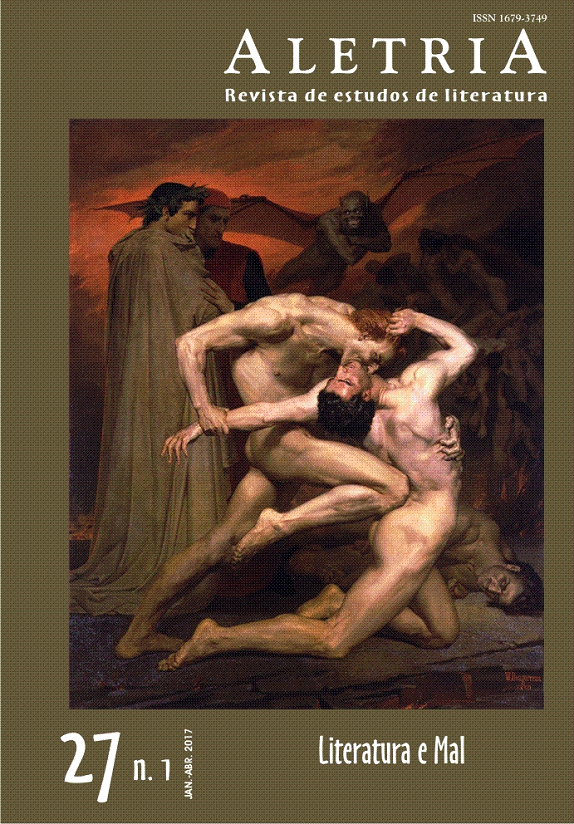Hate: “An Unequaled Power”: Representation of Political Evil in Aprender a Rezar na Era da Técnica
DOI:
https://doi.org/10.17851/2317-2096.27.1.109-125Keywords:
evil, Gonçalo M. Tavares, Aprender a rezar na era da técnica, state violence, biopoliticsAbstract
The fiction of resistance, based on the trauma experience and in the perception of the primacy of evil as political práxis remains current and universal. The books of the series “O reino”, written by Gonçalo M. Tavares, show the timelessness of these problem with their somewhat dystopic plots, in an indefinite space-time that purposefully evoke the experiences of the period of totalitarianisms in Europe in the first half of the 20th century. In the analysis of Aprender a rezar na era da técnica, we propose to observe some nuances and details of this occurrence, bringing it closer to the concepts of state violence, by Walter Benjamin, and “biopolitics”, by Giorgio Agamben.
Downloads
References
AGAMBEN, Giorgio. Homo sacer: o poder soberano e a vida nua I. Trad. de Henrique Burigo. 2. ed. Belo Horizonte: Editora UFMG, 2002.
AGAMBEN, Giorgio. O que resta de Auschwitz: o arquivo e a testemunha. Trad. Selvino J. Assmann. São Paulo: Boitempo, 2008. (Homo sacer, v. 3).
BATAILLE, Georges. A literatura e o mal. Trad. Suely Bastos. Porto Alegre: L&PM, 1989.
BENJAMIN, Walter. Para uma crítica da violência. In: BENJAMIN, Walter. Escritos sobre mito e linguagem. Trad. Ernani Chaves. São Paulo: Editora 34; Duas Cidades, 2013. p. 121-156.
FARIA, Ângela Beatriz Carvalho. A grande barbárie é a infidelidade do homem à sua própria humanidade – a propósito de Jerusalém, de Gonçalo Mendes Tavares. In: CONGRESSO INTERNACIONAL DA ABRALIC, 11., 2008, São Paulo. Anais... São Paulo: ABRALIC, 2009. Disponível em: http://www.abralic.org.br/eventos/cong2008/AnaisOnline/simposios/pdf/001/ANGELA_FARIA.pdf. Acesso em: 6 jul. 2015.
FOUCAULT, Michel. A governamentalidade. In: FOUCAULT, Michel. Microfísica do poder. Rio de Janeiro: Graal, 1978. p. 277-293.
SELIGMANN-SILVA, Márcio. História, memória, literatura: o testemunho na era das catástrofes. Campinas: Editora da Unicamp, 2003.
STEINER, George. No castelo do Barba Azul: algumas notas para a redefinição da cultura. Lisboa: Relógio d’Água, 1992.
TAVARES, Gonçalo Manuel. Aprender a rezar na era da técnica: posição no mundo de Lenz Buchmann. São Paulo: Companhia das Letras, 2008.
TAVARES, Gonçalo Manuel. Gonçalo Manuel Tavares – Imagem da Palavra – Parte 2. 12 jul. 2013. Entrevista. Disponível em: https://www.youtube.com/watch?v=UA13VVdk2K4. Acesso em: 6 jul. 2015.
Downloads
Additional Files
Published
How to Cite
Issue
Section
License
Copyright (c) 2017 Marcelo Franz (Autor)

This work is licensed under a Creative Commons Attribution 4.0 International License.
Authors who publish with this journal agree to the following terms:Authors retain copyright and grant the journal right of first publication with the work simultaneously licensed under a Creative Commons Attribution Non-Commercial No Derivatives License that allows others to share the work with an acknowledgement of the work's authorship and initial publication in this journal.Authors are able to enter into separate, additional contractual arrangements for the non-exclusive distribution of the journal's published version of the work (e.g., post it to an institutional repository or publish it in a book), with an acknowledgement of its initial publication in this journal.Authors are permitted and encouraged to post their work online (e.g., in institutional repositories or on their website) prior to and during the submission process, as it can lead to productive exchanges, as well as earlier and greater citation of published work (See The Effect of Open Access).





